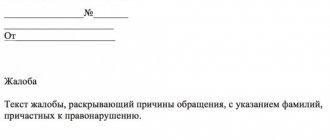Find out the reason
Of course, the first thing you need to do is ask the child about who is offending him and how. Find out whether one or more teachers offend him, what they do, what words they say, whether he is the only one who is treated this way.
Perhaps the child is offended by the bad mark he was given for unfinished homework. Or that the teacher reprimanded him when he was talking to a friend during class. Or he is offended that the teacher is not calling him to the board for the third lesson in a row. In other words, the child is offended by what is simply the teacher performing his duties.
In this case, you must first of all talk with the child about discipline at school, about following the rules, about doing homework. You yourself may not share the position of the school as much as you like, but if your child goes to it, then it is better to take them into account, because otherwise the child will have a bad time at school: constant confrontation with teachers, constant struggle, aggravation of relations with other children, and so on. Further.
It is a completely different matter if the child is insulted, ridiculed in front of the whole class, or is never called to the board, and therefore does not have enough grades. In this case, of course, it is worth clarifying the situation at school with teachers, but remember: if the child does not lie, this does not mean that he is telling the truth. He could hear and remember in his own way, succumb to the general opinion of the class, misunderstand and, without a drop of lies, distort the situation both for his parents and for himself. This is not a call to stop believing your child, but a call to clarify the situation, even if the child is ready to swear to you that everything was exactly as he tells it.
Don't get too hot
What to do if you are convinced that the teacher was unfair to the child - he exaggerated the scale of the problem, or even attributed non-existent sins? “After you have firmly and civilly made it clear to the teacher that you will not allow your son or daughter to be offended,
take a break .
Watch how the situation develops in the coming weeks and months,” recommends Nadezhda Georgieva. There is a good chance that the claims will disappear. If the nagging continues, seek help from the class teacher, head teacher, or director. In some cases, you may think about transferring your child to another class or school.
Don't cut from the shoulder
Many parents, having heard that one of the teachers at school offended their child, will instantly take the side of the child. And this is wonderful (because the child should feel parental protection), but it is important to remember that in protecting the child, it is not at all necessary to start a war with the school.
Unfortunately, it is not uncommon for heated mothers and fathers to rush into the teacher’s room, starting an angry monologue, two-thirds consisting of accusations and threats. But such behavior is more likely to lead to retaliatory attacks than to solving the problem. Indeed, often teachers are not even aware that someone was offended, because too many children pass through their class every day. And not every child will directly say if something has offended him. The teacher may not notice, may consider this a method of education, or may simply flare up, that is, he simply did not understand that the child, it turns out, was offended. And the teacher should be informed about this, and calmly and kindly. This will help you come to an understanding and save nerves on both sides.
But unfortunately, there is a worse option. That is, the teacher violates the child’s rights, systematically humiliates him, devalues and ridicules his personality, interferes with the acquisition of knowledge and correction of grades (we are not talking about the last day of the quarter). And then you need to stand up for the child, because if not you, then who?
A teacher has no right to insult a student
And this is not only a moral, but also a legal norm.
Federal Law “On Education in the Russian Federation” N 273-FZ on the duties and responsibilities of teaching staff very clearly defines that teaching staff are obliged to respect the honor and dignity of students and other participants in educational relations.
That is, if you are sure that the child was actually insulted or humiliated, this problem needs to be dealt with. And if this is proven, the teacher will face punishment, up to and including dismissal.
Or maybe there was no insult?
This also happens. Children are touchy. And a harmless remark from a teacher may seem like a real tragedy to a little person with a great sense of self-worth.
In this case, the parents must first understand for themselves whether an insult has taken place. For example, a little girl was offended when the teacher reproached her for constantly being late for classes: “Vika, you sleep too deeply. You probably have very warm pajamas and a very soft bed?” Classmates laughed, and the schoolgirl began to cry. Mom, having learned about this, was at first indignant, and then decided to turn it all into a joke. At the “family council” they came to the conclusion that we needed to leave the house early, and that was the end of it. The child calmed down. The incident is over.
Another case is not so harmless. A schoolboy came to school after the holidays with a new hairstyle and dyed hair. The physical education teacher began to make dirty jokes about him about the fact that “now he’s not sure which group to put him in – girls or boys. And is he safe in the locker room? This can already be qualified as an insult to a student by a teacher. In this case, parental intervention is quite appropriate.
An insult is considered a public humiliation of dignity. Where to draw the line between a harmless joke and humiliation is primarily up to you to decide. And later, perhaps, to lawyers.
Photo source stockking/freepik
How to protect a child from teachers?
When talking with a teacher, be prepared for the fact that he will explain everything to you very clearly: he will explain his actions by the child’s behavior, the child’s behavior by the characteristics of his own personality, and your reaction by ignorance of the entire situation. After listening to the teacher’s version, be prepared either for his aggression, or for cold indifference, or for tears and pressure for pity.
The work of a teacher is indeed very hard work, requiring a huge amount of internal resources. I do not at all set myself the goal of devaluing the feelings or merits of teachers. But none of the above gives them the right to hurt your child. You can treat the teacher with understanding, and perhaps he will not be a bad person at all - but this does not mean that you should withdraw your complaints. Your demand to stop putting pressure on your child should still remain in force.
Be prepared for the fact that during the proceedings it will suddenly become clear that your child is not an angel, and all sorts of “atrocities” are behind him. Usually this trump card is played last, to show you “who you are protecting now.” If this happens, then, although this does not apply to the situation that you came to deal with, still take note and check. And if it turns out that you were told the truth, it means that the child has behavioral problems that you did not know about before, and these problems need to be solved. After all, this is your direct responsibility as a parent.
If during your conversation you do not come to an agreement, then there is always the school administration, which really does not like it when its employees offend children. Once again, I note that you should contact the management not first, but last, because you will still have to find out what happened with a particular teacher, but he, knowing that you started by complaining about him to his superiors, will be biased towards you . There is a very fine line between protecting your child and trying to change the teacher. Limit yourself to the first, because the second is most often impossible.
Another link between the teacher and the administration is the school psychologist. It is clear that not all schools have him, and, unfortunately, he is not always competent enough, but you can also turn to him with a request to resolve these relations. The psychologist has advantages: he is not a boss, not a subordinate, and not a colleague for teachers, but nevertheless he is in a special position and reports directly to the school director. At the same time, he has psychological knowledge and the skill of conveying the desired thought to a person. In addition, he knows teachers well and can often testify to how real what is being discussed is. You shouldn't give up such a useful ally if you get the chance.
Apologize if you were harsh with the teacher
“Not every teacher will accept disagreement with his point of view without objections and resistance,
” the psychologist warns.
“ Be prepared to defend your beliefs – convincingly and correctly.”
But if it so happens that you got excited and said sharp words to the teacher, and after a while you regretted it, find the courage
to apologize
.
“I took the situation too personally. I had the feeling that my child and I were being attacked, and I rushed to defend him and myself. I regret the harshness of my words and tone...” - such phrases will help return communication with the teacher to a constructive direction. Realizing that you were wrong and not making an attempt to correct the situation means making the problem worse. “If a child has a misunderstanding with a teacher,
the parent should help resolve the conflict .
A child, due to his age and limited life experience, is simply not able to cope alone,” says Nadezhda Georgieva. Therefore, when communicating with a teacher, weigh every word and think about the consequences
. And if you made a mistake, don’t delay “working on your mistakes.”
What to do if a child is bullied by a teacher at school?
All of the above related to working with one specific teacher. If there are several such teachers, then this does not change the essence of your actions, and each of the teachers must be dealt with separately.
So the algorithm is very simple. First, you find out the circumstances of the child and, based on your conversation with him, draw conclusions about how much this situation requires you to go to school. After all, if you are scolded for lack of homework, then it is much easier and more useful to start monitoring its completion.
If everything is more complicated, then contact the teacher with a request to clarify the situation. You shouldn’t start with accusations - it’s better to express your concern for the fate of your child. By the way, it is advisable to do this at least once a month, even without special reasons.
If the conversation with the teacher is unsuccessful, then seek the support of a psychologist or administration to look into it more seriously. Listen and take note of their demands and comments about your child's behavior, but remember that your goal now is to protect him.
After talking with the administration and the offending teacher, you can only take an interest in the child’s affairs at school and control those aspects of his school life for which you are responsible: homework, appearance, attendance and behavior at school.
Listen to two truths
First of all, the situation should be discussed with both parties
.
Ask your child whether he thinks the accusations are fair, and then find out what is happening from the teacher's point of view. “It is important that the parent is ready to cooperate with the teacher and does not take hostility to, perhaps, not the most pleasant information about his child,”
Nadezhda Georgieva emphasizes.
Listen with a cool head to everything the teacher deems necessary to say. Just assume that a person with special education and experience working with children notices something that you may be turning a blind eye to
or not giving due importance to.
Higher authorities
There are often cases when the director’s answer does not satisfy the child’s parents.
The most effective remedy against a boorish teacher and school management who turn a blind eye to what is happening is a complaint to the Department of Education. It exists at the local level (municipality) and at a higher level – regional (subject of the federation).
The lower the level, the faster the review will take place. Each application must be accompanied by a copy of the response from the lower authority.
Contacting official organizations will necessarily entail verification. If the facts stated in your complaint are confirmed, not only the teacher, but also the director will be punished. As a rule, disciplinary liability is imposed on the teacher, and administrative liability is imposed on the management.
Collective complaint against a teacher to the school principal
A collective appeal to the school principal can have a greater effect than an individual one. This is possible if they are oppressed for the interests of several children at once. It will be possible to file a collective complaint against a teacher if at least 3 parents agree to unite.
The document is drawn up according to standard rules, but differences from standard paper still exist. When filling out a collective complaint against a teacher, you need to state the current situation and the demands made not on your own behalf, but on behalf of the entire team. The document must also include the names of all parents who agreed to sign the letter. You can download a ready-made sample of a collective complaint here.
Going to court
There are times when the traditional parenting horror story of “I will go to court” actually makes sense. This is a situation where psychological or physical violence is used against a child,
In this case, you don’t have to waste time with administrative authorities at all, but immediately contact law enforcement: the police, the prosecutor’s office. You can also go to court.
But here you need to understand that going to court is advisable when there is harm that can be assessed from a material point of view. In this case, you can count on compensation for property and moral damage expressed in monetary terms.
Author of the article
Syplyva Yulia
To Moscow, to Moscow...
Don't give up if you feel like the local level hasn't paid enough attention to your problem.
After you have received a response from the regional education department and it does not satisfy you, you can contact the Russian Ministry of Education.
But not before. Naturally, the law does not prohibit filing a complaint directly with the highest authority, even the Presidential Administration - but you need to understand that if an appeal to a government body is not preceded by a complaint at a lower level, the Ministry of Education will simply redirect it for consideration to a municipal body.
It is not necessary to travel to the capital to file a complaint. It can be sent in writing, either by regular mail or electronically.
A written complaint is sent by Russian Post or courier or transport companies to the address: 127006, Moscow, st. Karetny Ryad, 2. An email can be sent to
Also on the website of the Ministry of Education there is a special resource for collecting complaints and appeals -.
Complaint against a primary school teacher
It is much more difficult to substantiate a claim against a primary school teacher. Having received the document, employees of authorized bodies take into account the fact that children at a young age are prone to fantasies. Sometimes the opposite situation happens. A primary school student may be afraid to tell his parents about violations by teachers.
Attention
To reduce the likelihood of a claim being rejected, it is recommended to consult a psychologist. The specialist will talk with the child and find out the real state of affairs. Based on the results of the work, he will provide a conclusion in writing. The paper must be attached to the complaint. A document supplemented by a specialist’s opinion can be more effective than a standard claim.
A complaint against a primary school teacher is made in the same way as in all other cases. You can download a completed sample document here.
How to write a complaint against a teacher to the school principal?
When making a complaint against a school teacher, a person must indicate the reasons for writing it and offer a way out of the current situation. The document does not have a legally established form. However, in practice, a standard structure has developed that is best adhered to. When filling out the application, it is recommended to follow the following rules:
- In the upper right corner of a complaint against a school teacher, an appeal to the director of the institution is written, indicating his full name. Additionally, it is necessary to record the full name of the educational institution in the document.
- The applicant must provide personal information. The paper must include your full name, residential address and date of birth. Additionally, you must indicate the details of the teacher against whom the complaint is being made.
- The document should briefly outline the essence of the appeal. You should not express emotions and get personal. The complaint to the school teacher must be drawn up in an official business style. The applicant must write what exactly he is dissatisfied with, provide evidence of his innocence, and also set out demands and proposals for resolving the current situation.
- Indicate what actions will be taken if the issue cannot be resolved. The presence of information in the document is mandatory.
- Indicate the date the paper was drawn up and sign. Details are indicated at the end of the document.
A person can make a claim independently or use a ready-made sample, which can be downloaded here.
Explanatory letter from the teacher regarding the parents' complaint
If a complaint is received from the child’s parents, the teacher has the right to write an explanatory note in his own defense. There is no unified form of the document. However, the school management has the right to approve it.
Attention
The teacher’s explanatory letter to the parents’ complaint is drawn up in a single copy. To compile it, use a blank A4 sheet. The paper should contain an explanation of the situation. The document can be handwritten or printed on a computer. The paper must contain the names of the participants in the situation, the date the paper was compiled, and the teacher’s signature.








